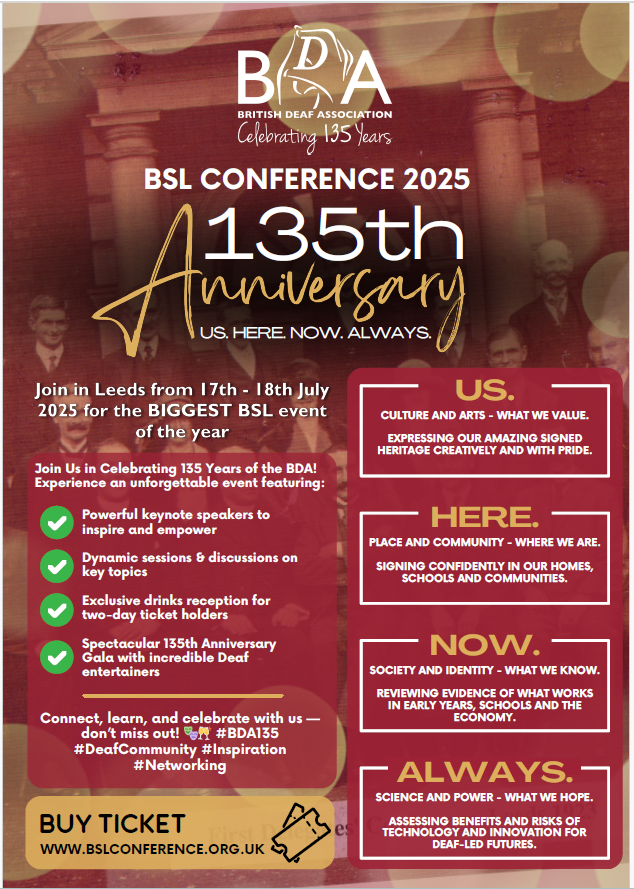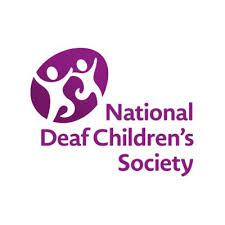BDA’s BSL Conference and 135th anniversary will be held in Leeds on 17th and 18th July 2025 followed by a BSL Fest on 19th July organised by BSL Celebration.
Purchase tickets via this link www.bslconference.org.uk
Download the BDA Conference 2025 poster to share with others

BSL CONFERENCE 2025
British Sign Language: Now and Always
🗓️ 17–18 July 2025 | 📍 The Queens Hotel, Leeds
Hosted by the British Deaf Association (BDA) — Celebrating 135 Years
This year marks the 135th anniversary of our Association, and we are very excited to bring together linguists, professionals, policymakers, families, Deaf leaders, and the wider British Sign Language (BSL) community to celebrate our language, share knowledge, and shape the future.
For over a century, the BDA has been at the forefront of advocating for the rights of Deaf people, working to ensure the recognition, inclusion, and promotion of BSL and Deaf culture in society. This conference is a vibrant reflection of our legacy, with a look back on the triumphs, challenges, and collective strength of our community, and looking forward at our future plans.
The BSL Conference 2025 will take place in the centre of Leeds—the very city where the BDA was founded in 1890. We will be joined by 1,000 attendees over two days from across the Deaf community, including professionals, public servants, Deaf leaders, families, and voluntary sector.
We promise you will leave the conference inspired by the presentations and will want to reinforce commitment to equity, inclusivity, language recognition and equal opportunities. We also believe this would be an excellent opportunity for you to engage directly with the BSL community.
The conference’s theme this year is ‘Us. Here. Now. Always.’ (full details below), aims to celebrate 135 years of cultural heritage. We will be bringing together 18 sector leaders and academics to deliver insightful talks to inspire our future. We are incredibly proud of our intangible cultural heritage and the wealth BSL brings to Deaf people’s lives. The conference aims to reframe the benefits of BSL, which have blighted the lives of so many Deaf people for 135 years, with the revolutionary ‘Economics of BSL’ report by RAND.
The theme Us. Here. Now. Always reflects current work addressing issues of culture, place and transmission of signing identities – “Sign languages are deeply intertwined with the cultural identity of Deaf communities. They play a crucial role in fostering a sense of belonging, enabling cultural preservation, and providing the raw material for artistic expression. Sign languages facilitate the transmission of folklore, storytelling, and historical narratives, allowing Deaf individuals to connect with their heritage and celebrate their unique identity.”
A central topic for the day will be the exciting development of proposals to include examples of British Sign Language (BSL) intangible cultural heritage (ICH) on UNESCO’s global list (https://ich.unesco.org/en/home) of ICH practices. The UK is preparing a submission to this archive at present, led by the Department of Culture, Media and Sport (DCMS). DCMS has asked the BDA to coordinate dialogue with the national BSL community to gather appropriate ICH material. What better opportunity to kick-start this process than a high-profile cultural event in Leeds on BDA’s 135th anniversary?
🔑 WHY SHOULD YOU ATTEND?
✅ Access Insights into Language Development
Engage in intensive dialogue about the vital role of British Sign Language in supporting bilingual communication strategies with deaf children.
✅ Gain Evidence-Based Insights
Sessions like “What Works in Early Years?” and “Signing in our Homes” present cutting-edge data and world-leading analysis on how deaf children acquire and use language.
✅ Enrich Family Communication
Learn how Family Sign Language transforms language access and bonding at home — and how to support parents in their journey.
✅ Engage with Deaf and Hearing Professionals
Share perspectives with a wide range of professionals and experts in your own field and allied disciplines.
✅ Stay Ahead with Tech & AI
Explore how AI is revolutionising communication access and what it means for your practice with a focus on “Computer Science: AI and Deaf Languaging.”
✅ Support Identity-Centered Practice
Understand the interplay of genetics, identity, and language in sessions like “Genetics and Deaf Identities” — critical for culturally sensitive, person-centred provision.
🗓️ FEATURED TOPICS
- Why Schools Should Sign
Explore the impact of sign bilingualism on language acquisition, cognition, and social-emotional development. - What Works in Early Years? – The Evidence
Best practices in early intervention, language stimulation, and support for deaf children and their families. - Signing in our Homes
Presentation of Family Sign at Home results — a vital lens on how language thrives at home. - Computer Science: AI & Deaf Languaging
What role will AI play in supporting communication and accessibility? - Genetics and Deaf Identities
How genetic factors interact with language, culture, and identity in an essential context for sensitive service delivery. - Deaf to the World: Sharing Deaf Identities with Pride
Understand Deaf identity from the community’s perspective — a key to inclusive, empowering practice. - Arts, Media & Representation
Explore how Deaf people express identity through creative media — and how this influences self-esteem and advocacy. - Political Science & Campaigning for Deaf Ideologies
Insight into the values and voices shaping the Deaf world — and how professionals can align with inclusive advocacy.
🧠 WHO SHOULD ATTEND?
- Linguists
- Paediatric Audiologists
- Speech & Language Therapists (SLTs)
- Early Intervention Specialists
- Schools
- SEND teams
- Deaf Education Professionals
- NHS and Independent Practitioners
- Clinical Service Leads & Policy Advisors
- Interpreters & Communication Support Staff
- Policy Makers
- MPs and Government Ministers
- Civil Servants
- Equality, Diversity and Inclusion leads
- BSL community
- Deaf organisations
Together, let’s shape a future where Deaf children’s language, identity, and potential are fully supported — in every setting, from clinic to classroom.
We hope to welcome you to Leeds!
BSL Conference 2025 Themes
- Culture & Arts: What we Value The importance of culture and arts, valuing our signed heritage creatively and with pride.
Sign languages are deeply intertwined with the cultural identity of Deaf communities. They play a crucial role in fostering a sense of belonging, enabling cultural preservation, and providing the raw material for artistic expression. Sign languages facilitate the transmission of folklore, storytelling, and historical narratives, allowing Deaf individuals to connect with their heritage and celebrate their unique identity.
By fully understanding our heritage we will be able to:
- understand why Deaf communities value our heritage so we can safeguard our language and culture to ensure it flourishes into the future
- identify the potential for creative and sustainable solutions to improve the condition of our intangible cultural heritage
- uncover new information, insights and fresh perspectives on our heritage.
Here. Place & Community: Where we Are Celebrating our community and place, where we continue to grow and shape a future of inclusion and recognition for all.
Deaf people in the UK have been oppressed and discriminated against for more than a century, limiting our life chances and blocking us from reaching our true potential. We live in a world that has been designed by hearing people.
Our language has finally been recognised by the UK Government. We must seize this opportunity to prepare the ground for the world we want, promote the nationwide learning of BSL and protect our language to ensure it flourishes long into the future. To do this, we need spaces where Deaf identities can thrive – wherever we learn, share and celebrate our language and unique way of being.
We must work in partnership with Deaf communities across the UK and vital allies such as hearing parents of deaf children. We must seize the historic opportunity presented by the BSL Act 2022 to shape the world we want. A world where Deaf people can finally achieve equitable civil rights. A world where our precious language and culture are recognised, included and celebrated.
Now. Society & Identity: What we know A focus on society and identity, reviewing the successes and challenges in education, early years, and the economy, and the evidence of what works for us.
For 135 long years, the British Deaf Association has presented the arguments in favour of BSL, leading the campaign for support of our language and our people.
It has been a never-ending challenge to convince the hearing world, governments, key authorities, public service leaders, policy-makers and opinion-formers that Deaf people know what is best for Deaf people.
Over many decades now, the data underpinning our claims has been steadily building. This is not hearsay. It’s not anecdotes. This is robust, reliable research undertaken by global leaders in universities and specialist institutes. It is designed and led by BSL signers, Deaf and hearing, whose expertise is highly respected and credible.
When BSL is put at the heart of policy throughout Deaf lives, we live well. You want evidence? Let us show you.
Always: Science & Power: What we hope Looking ahead with a focus on science and power, discussing the risks and benefits of technology and innovation for Deaf-led futures.
Deaf people sign because it feels right to us. This is not new – our signing heritage stretches way back into the past, since before records began.
But what about the future? Will our communities be sustained? Will our languages thrive? Will Deaf identities be present in society forever?
In 2025, social attitudes are largely supportive. Our languages are widely taught and learned. We have legal recognition at last. This gives us some protection.
However, threats and risks can be seen on the horizon, coming closer at speed. Scientific, technological and democratic changes face us all, and if we are not careful, they may not necessarily work in our favour.
We want all that is good about Deaf lives to continue. How do we make sure of it?




